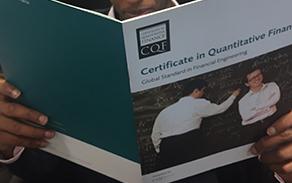Contact our team
32nd Floor,
NY, NY, 10019


The world of finance is constantly evolving, and with it, the factors that define responsible investment. Over recent years, Environmental, Social, and Governance (ESG) considerations have become increasingly important, prompting investors and companies to align their objectives with societal values. Yet, amidst the growing emphasis on ESG, a critical question remains: How can we quantitatively incorporate these factors into financial analysis and decision-making? Our new CQF advanced elective, taught by Dr. Alonso Peña, dives headfirst into this question, offering delegates a comprehensive approach to Quantitative Methods in ESG.
ESG stands for Environmental, Social, and Governance, three critical factors that measure the sustainability and ethical impact of an investment in a company or business. The environmental aspect considers a company's eco-friendly practices and impact on the planet. Social criteria assess how a firm manages relationships with employees, customers, and communities. Governance involves evaluating a company's leadership, fairness in executive compensation, and shareholder rights. ESG factors are integral in identifying sustainable and ethical investment opportunities that align long-term financial returns with positive societal outcomes.
The importance of ESG lies in its ability to provide a more comprehensive view of a company's long-term prospects, revealing risks and opportunities that traditional financial analyses might overlook. Environmental considerations are key in the face of climate change, social criteria are increasingly relevant as consumers demand corporate responsibility, and governance issues are critical for ensuring accountability. Investors are increasingly recognizing that ESG issues can significantly affect a company's performance and, consequently, its valuation. By integrating ESG into investment analysis, stakeholders can promote corporate behavior that is aligned with societal values, mitigate risk, and capitalize on the growing trend of sustainable investing. However, the challenge lies in translating the qualitative nature of ESG factors into quantitative models that can inform better investment decisions.
The new CQF advanced elective, Quantitative Methods for ESG, tackles this head-on, providing delegates with the techniques necessary to navigate the complexities of ESG data. By focusing on quantitative methods, the elective equips delegates with the ability to dissect non-traditional data sources, such as climate reports, social media, and satellite imagery, and integrate these insights into robust financial models and actionable insights.
The elective also delves into ESG Scores, a tool developed by leading rating agencies to synthesize complex ESG data into a digestible format. While these scores offer a potential solution for investors, they are not without their limitations. The elective teaches delegates to critically examine the advantages and disadvantages, equipping them with a nuanced understanding of these ratings.
Delegates also explore ESG through the lens of Agent-Based Models. These models simulate the interactions of individual agents, such as companies or investors, to predict the outcomes of various scenarios, including such as sea-levels rising and/or the COVID-19 pandemic. By dissecting one such model, delegates can grasp the potential and limitations of this approach for practical use in financial markets. The elective also outlines a framework for developing a climate stress testing methodology, enabling delegates to assess the resilience of financial portfolios under different climate scenarios.
Finally, the elective includes a series of hands-on Python Labs, based on publicly available databases, to enable delegates to apply the discussed techniques firsthand, ensuring they can implement these methods in their own roles.
As ESG continues to shape the investment landscape, the ability to quantitatively analyze and incorporate these factors into financial strategies becomes indispensable. Professionals looking to stand out in today’s job market need to ensure they have the practical, cutting-edge skillset that financial firms need to stay competitive.
The Certificate in Quantitative Finance (CQF) has been trusted by professionals around the world for the past 20 years to teach the theory and practical implementation of the latest quant finance and machine learning techniques used in industry. Delivered online, part-time, over six months by world-leading practitioners, the master’s-level program enables professionals to master essential skills without taking time out of their career. The advanced electives form the final part of the qualification, following six core modules, and enable delegates to specialize in areas of interest. Download a brochure today to find out more about the qualification and how it could enhance your career.

